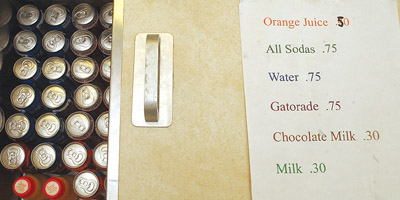Selling soda on elementary, middle and junior high school
campuses is a signature away from being banned.
A bill banning soda, SB 677, has cleared the California State
Legislature and is waiting signature from Gov. Gray Davis. Students
could still bring soda to campus, but could not purchase the
beverages at school.
Selling soda on elementary, middle and junior high school campuses is a signature away from being banned.
A bill banning soda, SB 677, has cleared the California State Legislature and is waiting signature from Gov. Gray Davis. Students could still bring soda to campus, but could not purchase the beverages at school.
“I’m all for (students) drinking juice, but they’re just going to bring soda from home,” said Cassie Freeman, manager of food services at the Hollister School District. “(The ban) might help curb consumption of sodas, but mom and dad are buying it and keeping it at home.”
The Hollister School District sells soda at its two middle schools, but does not at its six elementary campuses, Freeman said. Soda is not sold through vending machines and the district does not have a contract with a soda company. Soda is sold at the cafeteria and student store.
Because the cafeteria program at the HSD is self-supporting – it receives no money from the district – a ban on soda will impact the program. Freeman estimated the cafeteria program makes $6,000 from selling soda at the two middle schools – roughly 5 percent of its profits.
“The only income we receive is from lunches and snacks,” Freeman said. “(The ban) will effect our bottom line.”
Schools in the Aromas-San Juan Unified School District do not offer soda to students in grades K through 8 and there are no vending machines on either campus – Aromas School or San Juan School, both K-8 schools. Food and drinks are available through a cafeteria or snack bar, however.
“The soda ban will not affect us at all. Our students have no access to that,” said Joe Hudson, principal of San Juan School. “The decision (not to offer soda at school) was based on feedback from teachers as well as parents, that it was not a healthy choice.”
Alternatives include Gatorade, FruitWorks, juices, water and milk at local elementary and middle schools.
Despite the financial impact of the soda ban for the HSD, Freeman supports getting students to eat healthier, but she said parents also need to jump on the bandwagon.
It’s important for parents to monitor a child’s consumption of sugar while instilling a healthy lifestyle so they will choose healthier drinks and food when on their own, said Cindy Lamanna, a parent of three children.
“Do I think the ban will make or break kids’ education? No. I don’t think it matters either way. In a health sense, I think it would be better not to have it,” Lamanna said. “We (parents) can monitor it here (at home) all we want. In the long-run, I guess it would be better if the kids had more juice choices than soda.”
Lamanna is one parent who does not provide much soda for her children – a fourth-grader, eight-grader and 10th-grader. With the ban, she would “never allow in a million years” her children to take soda to school.
Lamanna’s children, Dane, 13, and Hailey, 14, admitted to drinking soda three times a week. Without soda being available to buy at school, both said they would drink water. However, Dane doesn’t think sodas should be banned.
“I don’t think so, because it’s a lot of the school’s money. Soda tastes better,” he said. “I don’t think kids would buy juices instead of soda. They would rather have water.”
Students pick soda over juices or water simply because “it tastes better,” Dane said.
State Sen. Deborah Ortiz, D-Sacramento, authored the bill because she found it hypocritical for schools to teach good nutrition while accepting revenue from soda vending machine sales. The bill originally included banning sales at high schools, but Assemblyman Dario Frommer, D-Los Feliz, insisted on exempting high schools. SB 677 would still allow campuses to sell sodas for fund-raising events before or after school hours.
“It’s going to have less of an impact at elementary schools as it would at the high school level,” said Jackie Munoz, ASJUSD superintendent. “It won’t be a major issue. The bottom line is our children’s’ health.”
Left for sale includes water, juice and milk. If signed by the governor, the ban on soda sales would take effect July 2004.
Also, if signed into law, many schools would take a hit from contract benefits with companies like Pepsi Co. and Coca-Cola Co. Schools rely on funding from vending machine contracts as well as funds provided by soda companies that help pay for field trips and athletic uniforms. The soda companies also like their presence on campuses for the purpose of product branding. Schools in San Benito County, however, are not as reliant on Pepsi Co. or Coca-Cola Co. as others.
Some school districts have already imposed a ban on the sale of soda, including the Los Angeles Unified School District.










